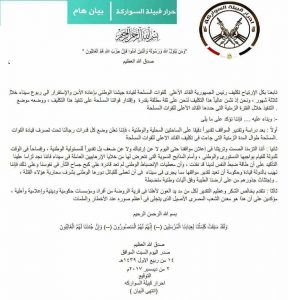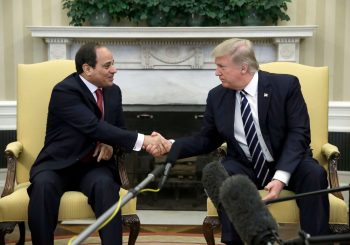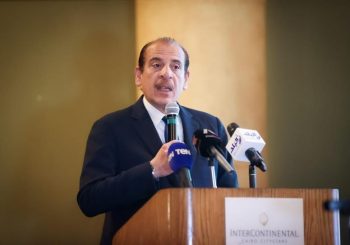In the wake of the gruesome attack on a mosque in the Bir al-Abd village in North Sinai on November 24, one of the peninsula’s largest and most powerful tribes has declared its willingness to help Egypt’s army to fight terrorist groupings in the region.
In a statement issued on Saturday, the Sawarka tribe – one of three main tribes in North Sinai – said that it supports President Abdel Fattah al-Sisi and that it has full confidence in the army’s ability to bring security and stability to the peninsula, while also offering to enlist members of the tribe to participate in combatting militant groups there.
“We declare that all the capabilities of our men are at the disposal of the Armed Forces Command for the duration of the mandate of the supreme commander of the Armed Forces,” the statement read, referring to an order issued last week by the President stipulating that the army should stabilize North Sinai within a three-month period.
The statement comes little over a week after a terrorist attack against North Sinai’s al-Rawda mosque killed over 300 people after gunmen opened fire on worshippers and detonated a bomb during Friday prayers. According to eyewitnesses, the attackers, wearing military-style attire, carried the black flag of the so-called Islamic State group.
In a speech during the celebration of the birth of Prophet Mohammad on Wednesday, President Sisi ordered the army and security forces to restore order in the restive peninsula using the “utmost force necessary”.
“I hold Lieutenant General Hegazy, along with the ministry of interior, responsible for restoring stability and security in Sinai within three months,” the President said.
In Saturday’s statement, the Sawarka tribe went on to call on the Egyptian government to allow local tribes to directly participate in the combat against armed groups.
“Faced with the bloody massacres which terrorist cells operating in the Sinai are subjecting us to, we need to stress that we have lost self-restraint, and the factors of national discipline no longer keep our feelings of vengeance in check. Therefore, we urge the government to reassess its stance towards the Sinai and allow tribes to play their patriotic role in fighting those murderers.”
Following last friday’s attack, a federation of tribes in the peninsula issued a joint statement calling on all capable tribal members to “take revenge” against IS for the massacre.
“For all who want revenge and punishment of this black terror and take revenge on IS and those who committed the crime of today and yesterday, we, again, welcome everyone to join the tribal fighters […] to stand against the fascist terrorism.”
Much Talk, Few Results
However, declarations like this has in the past produced little more than symbolic gestures of unity between the largely divided tribal factions which feud over a host of non-terrorism related local matters.
Also, enlisting local tribes to subdue militant threats in the region is not a novel approach employed by the Egyptian army. Three years ago, the army, considered by critics to lack sufficient counter-terrorism skills, started recruiting members of Sinai tribes to provide intelligence on the location of militant elements and their weapons smuggling routes.
Although the effort seems to have borne few concrete results, security and military sources told Reuters news agency that the November 24 massacre, the deadliest terrorist attack in Egypt’s modern history, has prompted officials to renew efforts to recruit local Sinai tribes to defeat terrorist groups.
“We asked them to help us to control the militants in the areas that they live, farm and move in, because each tribe knows its own people best,” one of the sources said.
“There are many things that make them cooperate with us and they vary from each tribe to the next. That’s why we sat separately with each tribe. One tribe needs services, and there is economic cooperation on projects with another tribe,” the source went on to say.
Despite the state’s potentially renewed efforts, a commonly-stated problem in the discussion of how to combat terrorism in the area is that the tribes of North Sinai must put their differences aside and unite.
The main tribes, which include the Sawarka, Armlet and Tarabin, are divided due to purely local reasons. A Sinai-based researcher speaking to online magazine Al-Monitor in May said that “No single tribe can confront [the terrorists] alone, rather they must come together to manage control [the area]. If this were to happen, it would be very easy to get rid of terrorism.”
However, on the likelihood that the tribes would unite, the researcher went on to say, that this is “very unlikely, for purely ethnic reasons. It is impossible, for example, for the Sawarka tribe to obey instructions from a person from the Tarabin tribe”.








Comments (0)